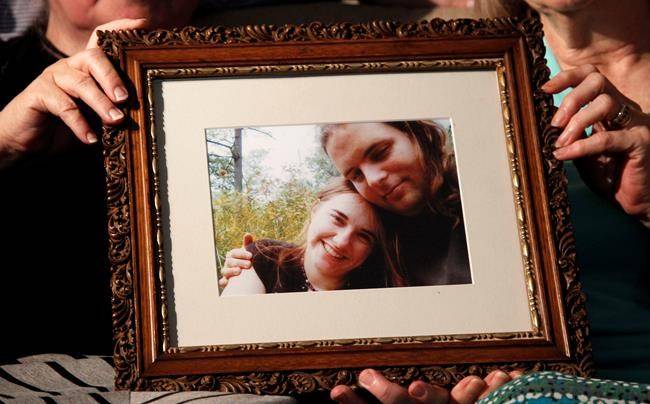A Canadian man, his American wife and their three young children have been released after being held captive for years by a network with ties to the Taliban, U.S. and Pakistani officials said Thursday.
U.S. officials say Pakistan secured the release of Joshua Boyle and his wife Caitlan Coleman, who were abducted five years ago while travelling in Afghanistan and had been held by the Haqqani network.
Coleman was pregnant when she was captured. The couple had three children while in captivity, and all have been freed, U.S. officials said.
“Yesterday, the United States government, working in conjunction with the Government of Pakistan, secured the release of the Boyle-Coleman family from captivity in Pakistan,” U.S. President Donald Trump said in a statement. “Today they are free.”
Representatives from the Canadian government did not immediately provide comment.
A U.S. national security official, speaking on condition of anonymity to discuss an ongoing operation, commended Pakistan for their critical assistance in securing the family’s release — and described the co-operation as an important step in the right direction for U.S.-Pakistani relations. The U.S. has long criticized Pakistan for failing to aggressively go after the Haqqanis, who have been behind many attacks against U.S. and allied forces in Afghanistan.
In Pakistan, its military said in a statement that U.S. intelligence agencies had been tracking the hostages and discovered they had come into Pakistan on Oct. 11 through its tribal areas bordering Afghanistan.
“All hostages were recovered safe and sound and are being repatriated to the country of their origin,” the military said.
Three Pakistani military officials, all speaking on condition of anonymity as they weren’t allowed to speak to journalists, also confirmed the hostages’ identities.
The release, which came together rapidly Wednesday, comes nearly five years to the day since Boyle and Coleman lost touch with their families while travelling in a mountainous region near the Afghan capital, Kabul.
The couple set off in the summer 2012 for a journey that took them to Russia, the central Asian countries of Kazakhstan, Tajikistan and Kyrgyzstan, and then to Afghanistan. Coleman’s parents last heard from their son-in-law on Oct. 8, 2012, from an internet cafe in what Boyle described as an “unsafe” part of Afghanistan.
In 2013, the couple appeared in two videos asking the U.S. government to free them.
A video released in August last year showed Coleman and Boyle warning that their captors would kill them and their children unless the government in Kabul ended its execution of Taliban prisoners.
Last December, in a video of the couple and two of their children that was uploaded to YouTube, the pair urged governments on all sides to reach a deal to secure the family’s freedom. Boyle’s parents had said the clip marked the first time they had seen their two grandchildren.
Patrick and Linda Boyle had said it was heartbreaking to watch their grandsons observing their surroundings while listening to their mother describe how they were made to watch her being “defiled.”
“It is an indescribable emotional sense one has watching a grandson making faces at the camera, while hearing our son’s leg chains clanging up and down on the floor as he tries to settle his son,” the Boyles said in a written statement. “It is unbelievable that they have had to shield their sons from their horrible reality for four years.”
The parents said their son told them in a letter that he and his wife tried to protect their children by pretending their signs of captivity are part of a game being played with guards.
In the clip, Coleman said she and her family had been living a “Kafkaesque nightmare” since 2012. The Boyles had said their daughter-in-law could not have used a more accurate term.
Meanwhile, Coleman’s parents, Jim and Lyn Coleman, told the online Circa News service in July 2016 that they received a letter from their daughter in November 2015, in which she wrote that she’d given birth to a second child in captivity. It’s unclear whether they knew she’d had a third.
“I pray to hear from you again, to hear how everybody is doing,” the letter said.
In that interview, Jim Coleman issued a plea to top Taliban commanders to be “kind and merciful” and let the couple go.
“As a man, father and now grandfather, I am asking you to show mercy and release my daughter, her husband, and our beautiful grandchildren,” he said. “Please grant them an opportunity to continue their lives with us, and bring peace to their families.”
U.S. officials call the Haqqani network a terrorist organization and have targeted its leaders with drone strikes. But the group also operates like a criminal network. Unlike the Islamic State group, it does not typically execute Western hostages, preferring to ransom them for cash.
___
Baldor reported from Tampa, Florida, and Colvin from Washington. Associated Press writer Jon Gambrell in Dubai, United Arab Emirates, contributed to this report.
Jill Colvin, Lolita C. Baldor And Munir Ahmed, The Associated Press



